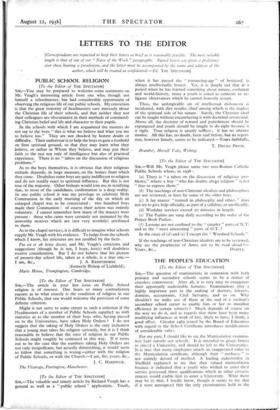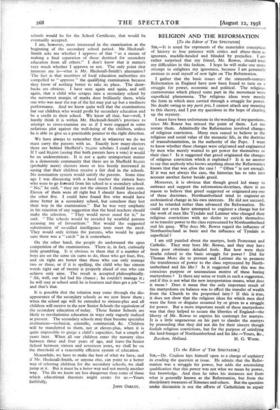THE PEOPLE'S EDUCATION
[To the Editor of THE SPECTATOR]
Sm,—The question of examinations in connexion with both primary and secondary schools seems to be a matter of ceaseless controversy. After all, it is very easy to exaggerate their apparently undesirable features. Examinations play a highly important part in the making of doctors, lawyers, dentists, accountants, Civil Servants, and so on. Why shouldn't we make use of them at the end of a student's secondary school career to enable him or her to manifest efficiency in certain subjects ? Much depends of course on the way we do it, and as regards that there have been many modifying influences at work of late, likely to have, I think, a good effect. Circular 1463 issued by the Board of Education with regard to the School Certificate introduces modifications of considerable value.
For my part, I should like to see the Matriculation examina- tion kept outside our schools. It is intended to gauge fitness to attend a University, and should be left to the Universities. It is true that many employers attach an exaggerated value to the Matriculation certificate, although their " madness " is not entirely devoid of method. A leading industrialist in Sheffield explained to me that they valued matriculation because it indicated that a youth who wished to enter their service possessed those qualifications which in other circum- stances would enable him to enter a University. What there may be in that, I hardly know, though it seems to, me that if it were announced that the only examinations held in the schools would be for the School Certificate, that would be eventually accepted.
I am, however, more interested in the examination at the beginning of the secondary school period. Mr. Heckstall- Smith asks me whether I approve of that " as a means of making a final separation of those destined for secondary education from all others." I don't know that it matters very much whether I approve or not. The only point that interests me is—what is Mr. Heckstall-Smith's alternative? The fact is that members of local education authorities are compelled to " approve " the qualifying examination because they know of nothing better to take its place. The draw- backs are obvious. I have seen again and again, and still. again, that a child who scrapes into a secondary school by the narrowest margin of marks does brilliantly there, while one who was near the top of the list may put up but a mediocre performance. And we know quite well that the examinations bar out children who would profit by secondary education and be a credit to their school. We know all that, but—well, I hardly think it is within Mr. Heckstall-Smith's province to attempt to cross-examine me as if I were engaged in some nefarious plot against the well-being of the children, unless he is able to give us a practicable pointer to the right direction.
We have always to remember that in whatever we do we must carry the parents with us. Exactly how many electors there are behind Sheffield's 70,000 scholars I could not say. If I said 80,000 (seeing that both parents have a vote) it would be an underestimate. It is not a quite unimportant matter in a democratic community that there are in Sheffield 8o,000 (probably more) electors more or less keenly interested in seeing that their children receive a fair deal in the schools. No nomination system would satisfy the parents. Some time ago I was discussing with a head teacher the sixteen boys who were to go forward from his school to a secondary school. " No," he said, " they are not the sixteen I should have sent. Eleven of them were all right but I should have discarded the other five. I could have found five who would have done better in a secondary school, but somehow they lost their way in the examination." But he was very emphatic in his rejection of any suggestion that the head teachers should make the selection. " They would never stand for it," he said. " The schools would be invaded by wrathful parents accusing me of favouritism." Nor would the suggested substitution of so-called intelligence tests meet the need. They would only irritate the parents, who would be quite sure there was a " catch " in it somewhere.
On the other hand, the people do understand the open competition of the examinations. There is, in fact, curiously little grumbling. It is obvious to them that if a number of boys are set the same six sums to do, those who get four, five, and six right are better than those who can only manage two or three, or if it is spelling, the child who has sixteen words right out of twenty is properly ahead of one who can achieve only nine. The result is accepted philosophically. " Ah, well, our lad had his chance ; he couldn't manage it ; he will stay at school until he is fourteen and then get a job "- and that's that.
It is possible that the solution may come through the dis- appearance of the secondary schools as we now know them when the school age will be extended to sixteen-plus and all children will receive in the new Senior Schools the equivalent of the secondary education of today. Those Senior Schools are likely to revolutionise education in ways only vaguely realised at present. The secondary schools may then become specialist institutions—technical, scientific, commercial, &c. Children will be transferred to them, not at eleven-plus, when it is quite impossible to gauge a child's capacities, but a couple of years later. When all our children enter the nursery class between three and four years of age, and leave the Senior School between sixteen and seventeen years, we shall be on the threshold of a reasonably efficient system of education.
Meanwhile, we have to make the best of what we have, and if Mr. Heckstall-Smith, or anyone else, can point to a better way of selecting children for the secondary schools, we shall jump at it. But it must be a better way and not merely another way. The ills we know are less dangerous than some of those which educational theorists might create for us.—Yours faithfully,
JOHN OAKLEY.







































 Previous page
Previous page